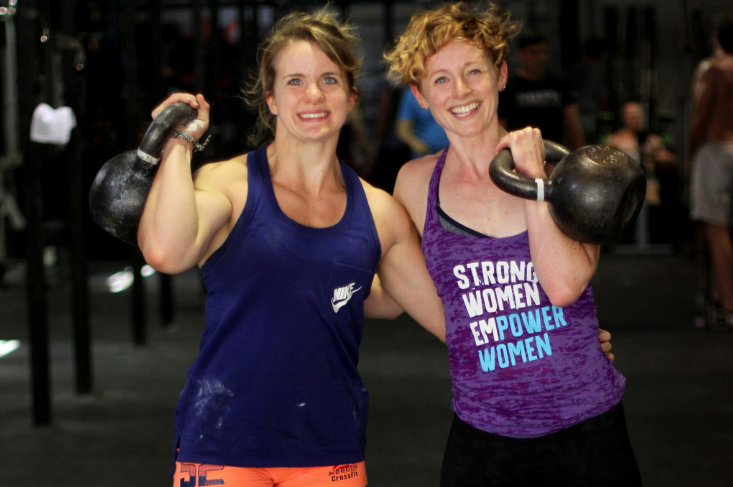
Are You Over-Training, or Under-Recovering?
Written by Calvin Sun
(Originally published on June 8, 2009)
Are you really overtraining? Sure, you might be experiencing some of the symptoms of overtraining but are you really training that hard? Michele’s post on overtraining suggests that working out without rest leads to the condition. I agree with Michele that people who do two workouts everyday under the assumption that more is better will quickly hit a point of diminishing returns. However, in my experience, I think the larger problem for the majority of our athletes is not training enough. Let’s be honest, on average, how many days a week do you train? If you only manage to get in 3 or 4 days a week, you are not overtrained. Yet you complain of fatigue, altered sleep patterns, mood swings, increased frequency of illness, persistent muscle soreness, and weight loss. Have you ever considered you might be under-recovered? You might not be doing too many WODs, instead you probably aren’t doing enough to make sure you are properly recovered from your training. Rest is only the tip of the iceberg when it comes to recovery. There are many aspects to proper recovery:
Nutrition
Nutrition is the biochemical foundation that fuels our bodies. You can’t repair muscles without adequate intake of high-quality protein. Chicken, fish, beef, and eggs are all great choices because of their complete amino acid profiles. Carbohydrates are stored in your muscles and liver as glycogen. You need to eat some quality carbohydrates in order to replenish yourself. Vegetables, fruits, and some starchy tubers (i.e. sweet potatoes) are all good choices. Grab one of Michele’s delicious “Invictus Shots” after your next WOD to make sure you are getting the fuel your body needs. Don’t forget to eat some healthy fat as well. Besides serving as an energy source, fat helps you absorb fat-soluble nutrients like vitamins A, D, E, and K. Read the The Paleo Diet for Athletes by Dr. Loren Cordain for more information.
Sleep
Get at least 7 to 8 hours of sleep every night. During sleep, your body releases a chemical cocktail that will help enhance your recovery and give you the greatest benefit from your training. Muscle tissues are repaired and the central nervous system is rejuvenated allowing for you to train at peak performance the next day.
Rest Days
As I mentioned earlier, Michele is spot on with this one. If you are training hard enough, you will need to rest once every 2 to 3 days. Following a 3-on/1-off schedule or even a 3-on/1-off/2-on/1-off schedule would serve to benefit you. Active recovery is great, go for a swim, a quick jog, or even a round of golf.
Myofascial Release
The repeated microtrauma from training everyday can take its toll on your body. Adhesions and trigger points can lead to all sorts of pain in both your muscles and your joints. Grab a foam roller and start rolling out your muscles. Lats, pecs, traps, glutes, quads, and hip flexors are the hot spots you’ll definitely want to hit everyday. Lacrosse balls are great for calves and glutes as well. The taped balls are perfect for rolling the thoracic erectors as well performing t-spine mobilization. Feel free to schedule a massage but you’ll want to make sure you are doing some damage control on a daily basis.
Stretching
Do not save the stretching for rest days. Tight hamstrings, tight calves and tight hip flexors are often to blame for the pain and injuries experienced by athletes. Do yourself a favor and stretch out after every workout. You don’t have to stretch out immediately after the WOD. I realize people have to get to work or get home for dinner, just make sure you do stretch sometime between the completion of your workout and your 7 to 8 hours of sleep.
NSAIDs
Lay off the Motrin. There is a normal healing process that occurs after an injury. The first 2 to 4 days are the inflammatory response phase. This phase is essential for initiating the healing process. When you take a non-steroidal anti-inflammatory drug, like ibuprofen, the entire healing process is halted. Read more in Kelly Starrett’s article.
Cryotherapy
Instead of drugs, use ice as it can help with the inflammation associated with the muscle soreness experienced after training. Use ice packs, ice baths, ice cups, ice massage, just not ice cream.
Fish Oil
Supplementing your diet with fish oil can reduce inflammation as well as help lubricate your joints. Read Mark’s post here. Dietary supplements should always be the last thing to add to your recovery program. Make sure your nutrition is solid before adding fish oil or any other supplement for that matter.
Having an effective and comprehensive recovery program in place is essential for your continued success as an athlete. Failing to do so will inevitably lead to training plateaus and/or injuries. You should strive to combat under-recovery with the same persistence and dedication that you have in your training. Remember, elite human performance requires an equally high level of maintenance and care.